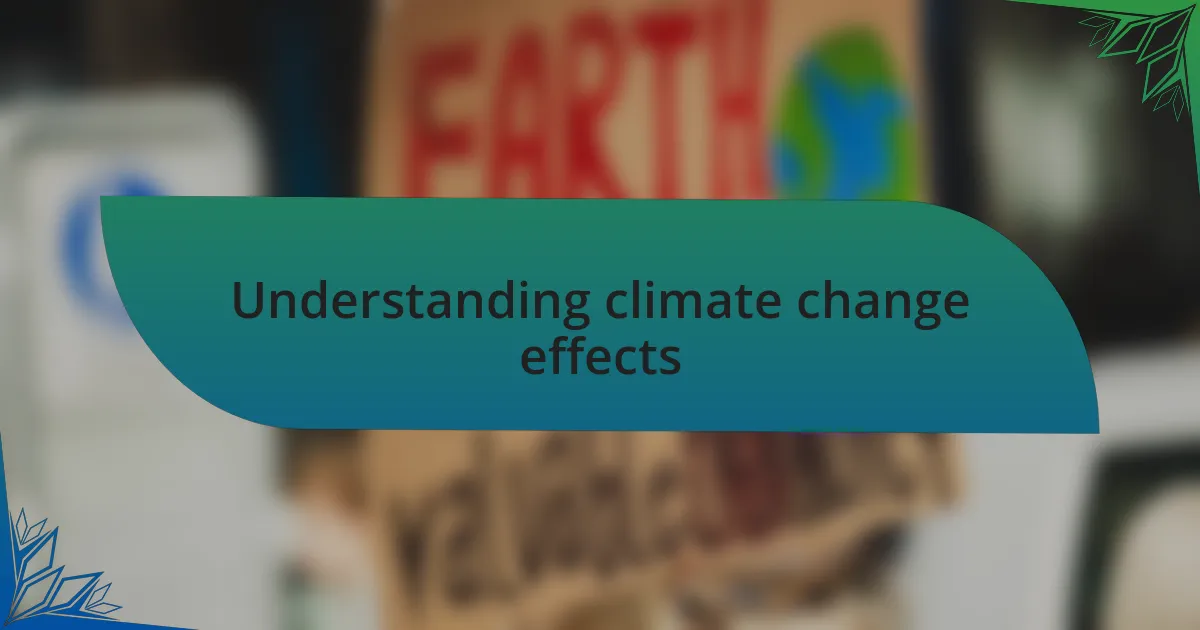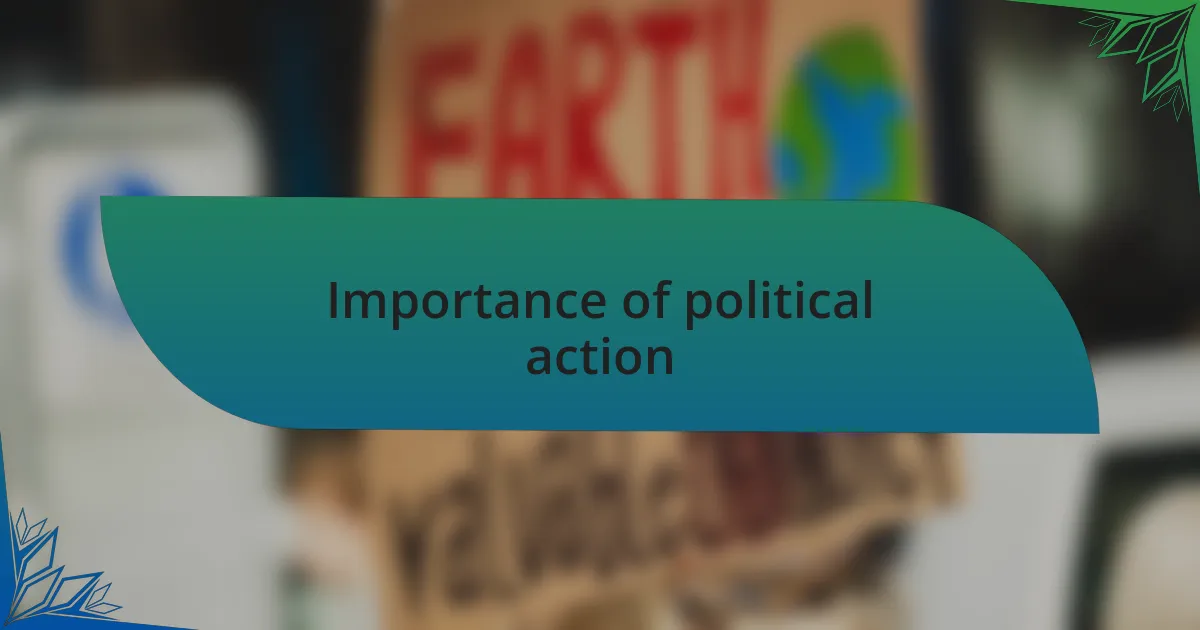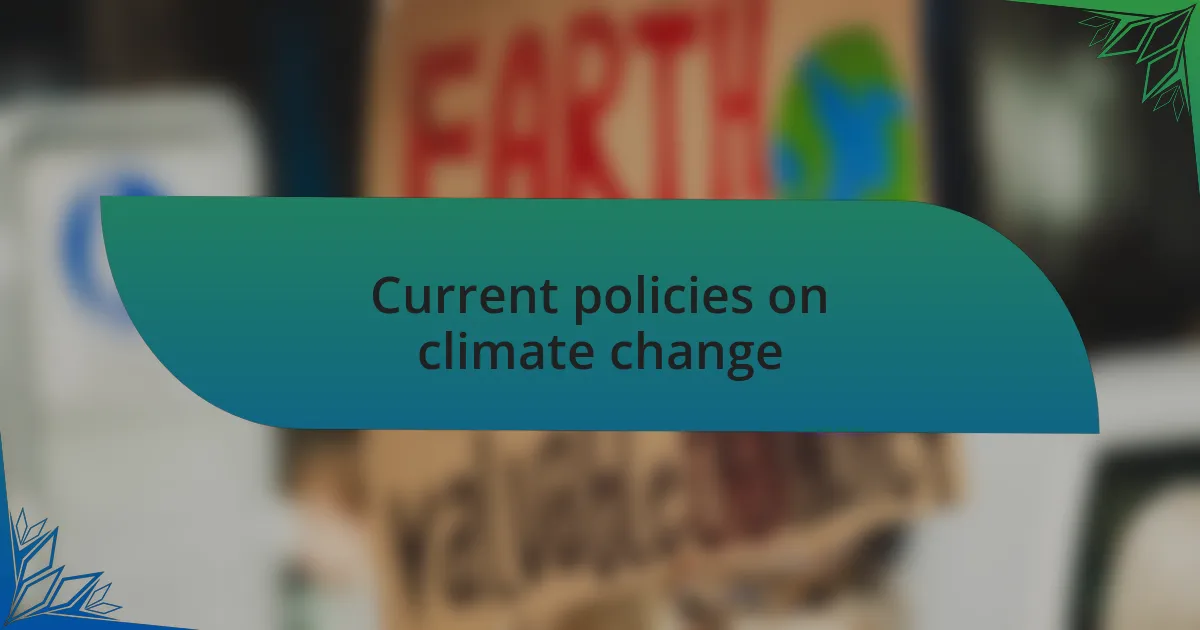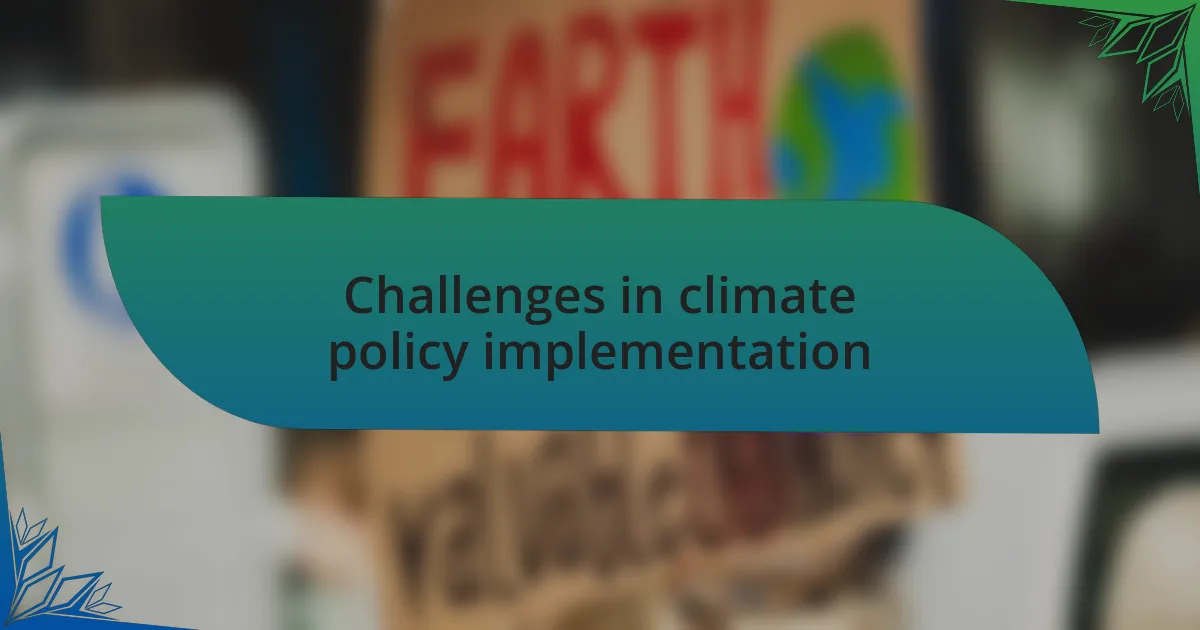Key takeaways:
- Climate change profoundly affects daily life, altering local ecosystems and reducing pollinator populations, which impacts food production and biodiversity.
- Political action is crucial for implementing effective climate policies, as grassroots efforts often need systemic support to drive real change.
- Current policies emphasize reducing greenhouse gas emissions and transitioning to renewable energy, but commitment levels vary across nations, raising questions about accountability.
- Challenges in climate policy implementation include political opposition, public engagement issues, and the need for equitable solutions across different sectors.

Understanding climate change effects
When I reflect on the effects of climate change, I can’t help but be struck by how deeply it impacts our everyday lives. For instance, I once visited a town that used to flourish with lush greenery, but now it feels like a desert landscape, dried out and cracking under the sun. It’s amazing how something as seemingly distant as climate patterns can translate into visible changes right before our eyes.
My experience volunteering in a community garden has taught me just how intertwined our local ecosystems are with these climate shifts. I often find myself asking, how can we sit by while our pollinators struggle to survive in increasingly hostile conditions? It’s heart-wrenching to witness a decrease in bee populations; these tiny creatures play a monumental role in food production and biodiversity, and their decline sends ripples through our environment.
On a personal level, the warming climate has altered how I think about seasonal activities. I remember eagerly waiting for winter hikes in the snowy mountains, only to be met with less snow and warmer conditions. It raises a question that I find myself pondering often: what legacy are we leaving for future generations if they can’t experience the same seasonal joy that I took for granted? Understanding these effects isn’t just about science; it’s about real lives, real emotions, and the shared futures we all hope to protect.

Importance of political action
Political action is vital for addressing climate change effectively. I recall a town hall meeting I attended where passionate community members advocated for sustainable policies. Their conviction made me realize how local governance can directly influence environmental practices, shaping our community’s future.
Without political will, grassroots efforts often struggle to achieve real change. I remember volunteering for a clean-up event that highlighted just how much litter plagued our parks—yet, I couldn’t help but wonder: how can we expect individuals to act responsibly when systemic support is lacking? Legislation that emphasizes environmental protection can drive the cultural shift we desperately need.
Furthermore, I’ve seen firsthand how bold political action can inspire collective responsibility. Participating in a youth climate strike opened my eyes to the power of unified voices calling for change. It made me think: if we can mobilize people around a common cause, what else can we accomplish when we hold our leaders accountable for the environment? Each step toward political engagement feels like a step toward reclaiming our planet’s health.

Current policies on climate change
Current policies on climate change vary significantly depending on the region, but some trends are emerging. For instance, many countries are setting ambitious targets for reducing greenhouse gas emissions. I remember feeling hopeful when leaders announced plans to achieve net-zero emissions; it made me question, can we truly align our economic systems with these bold goals, or are they merely political rhetoric?
In the context of the United States, the shift toward renewable energy sources has been a focal point of recent legislation. I watched a documentary that showcased small towns transforming their economies around wind and solar energy. It was inspiring to see how effective policy can create jobs while also addressing environmental issues. This makes me wonder—if local governments embraced similar initiatives, how much more progress could we achieve?
Internationally, agreements like the Paris Accord symbolize a collective commitment to fighting climate change. Yet, as I reflect on the varying levels of commitment among nations, I can’t help but ask: are these agreements enough to hold governments accountable? I’ve found myself wrestling with this question, especially when I see severe weather events becoming more frequent. The urgency to act is palpable, and I believe we need more than policies; we need an unwavering commitment to follow through on them.

Challenges in climate policy implementation
Implementing climate policies faces numerous challenges that often stem from political opposition and economic interests. I’ve witnessed firsthand how local policymakers can be hesitant to adopt necessary measures due to fears of job losses in traditional industries. It leaves me wondering: how can we bridge the gap between short-term economic fears and long-term environmental benefits?
Another significant hurdle is public engagement and understanding. I recall attending a town hall meeting where only a handful of people were aware of the details of new climate initiatives. This lack of awareness can lead to apathy and resistance to change, making me realize that effective communication is crucial. How can policymakers ensure that everyone feels included and informed about these pressing issues?
Finally, integrating climate policies across different sectors presents its own set of complexities. For instance, I’ve seen how farmers struggle with water management regulations meant to conserve resources while still trying to maintain productivity. This tension raises a critical question: how do we create solutions that are equitable and practical for all stakeholders involved? Balancing such diverse interests is undoubtedly a challenging but essential aspect of the policy-making process.